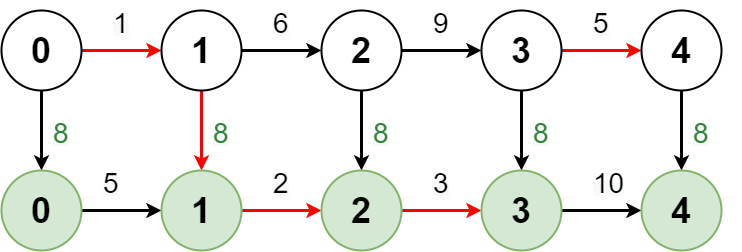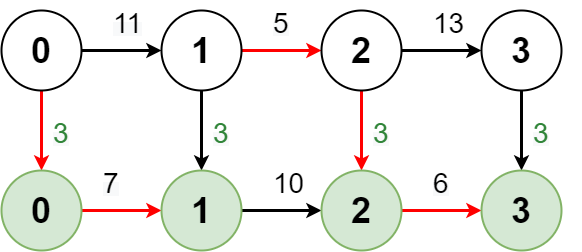A train line going through a city has two routes, the regular route and the express route. Both routes go through the same n + 1 stops labeled from 0 to n. Initially, you start on the regular route at stop 0.
You are given two 1-indexed integer arrays regular and express, both of length n. regular[i] describes the cost it takes to go from stop i - 1 to stop i using the regular route, and express[i] describes the cost it takes to go from stop i - 1 to stop i using the express route.
You are also given an integer expressCost which represents the cost to transfer from the regular route to the express route.
Note that:
- There is no cost to transfer from the express route back to the regular route.
- You pay
expressCostevery time you transfer from the regular route to the express route. - There is no extra cost to stay on the express route.
Return a 1-indexed array costs of length n, where costs[i] is the minimum cost to reach stop i from stop 0.
Note that a stop can be counted as reached from either route.
Example 1:
Input: regular = [1,6,9,5], express = [5,2,3,10], expressCost = 8 Output: [1,7,14,19] Explanation: The diagram above shows how to reach stop 4 from stop 0 with minimum cost. - Take the regular route from stop 0 to stop 1, costing 1. - Take the express route from stop 1 to stop 2, costing 8 + 2 = 10. - Take the express route from stop 2 to stop 3, costing 3. - Take the regular route from stop 3 to stop 4, costing 5. The total cost is 1 + 10 + 3 + 5 = 19. Note that a different route could be taken to reach the other stops with minimum cost.
Example 2:
Input: regular = [11,5,13], express = [7,10,6], expressCost = 3 Output: [10,15,24] Explanation: The diagram above shows how to reach stop 3 from stop 0 with minimum cost. - Take the express route from stop 0 to stop 1, costing 3 + 7 = 10. - Take the regular route from stop 1 to stop 2, costing 5. - Take the express route from stop 2 to stop 3, costing 3 + 6 = 9. The total cost is 10 + 5 + 9 = 24. Note that the expressCost is paid again to transfer back to the express route.
Constraints:
n == regular.length == express.length1 <= n <= 1051 <= regular[i], express[i], expressCost <= 105

